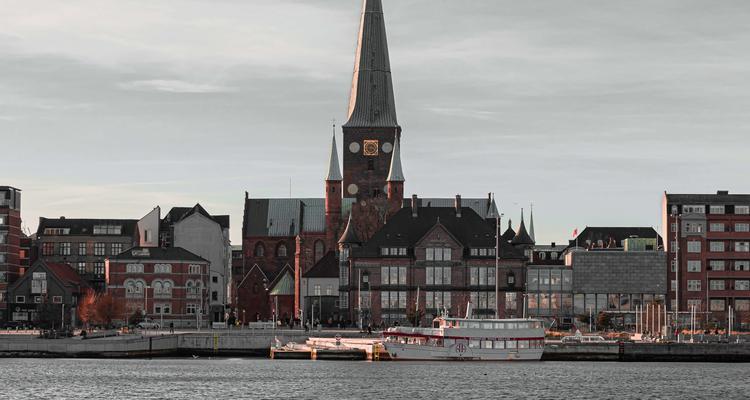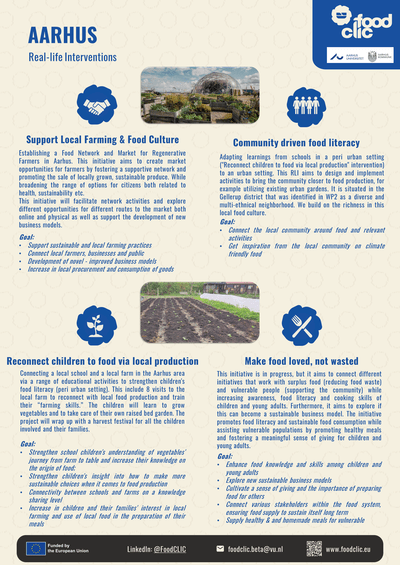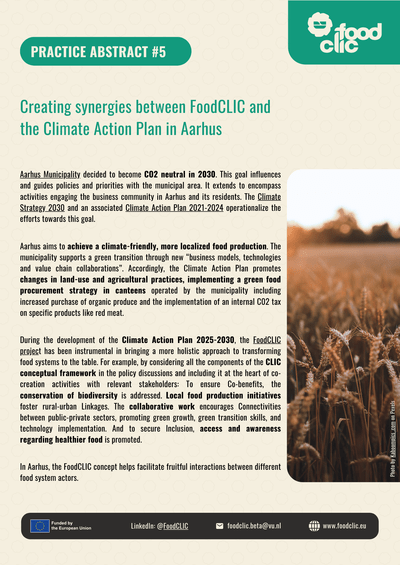
THE AARHUS CITY-REGION FOOD SYSTEM.
In the Aarhus regional food system, large retailers and supermarkets are the leading food suppliers. Consumers are able to get a wide range of products throughout the year, regardless of the season.
Small-scale farmers sell their products on farmers' markets or on their own farms. Local food matters, and small-scale farmes as well as asmaller community gardens can be found in the suburb of Aarhus. However, there is potential of increasing the general interest in locally sourced products. Several smaller community gardens, run by different initiatives, have the intention to increase the understanding for fruit and vegetable cultivation.
The city of Aarhus has a strong hospitality sector, with restaurants and street food markets. The municipality manages multiple canteens in schools, workplaces and the hospital. Several food-related policies (related to procurement, transportation, health care, schools and land use amongst others) mandated by the city council, regulate the provision of food to these public cafeterias. In 2022, a green procurement strategy has been implemented, for instance.
Sustainability, environmental friendliness and the ecological footprint are important factors for many Danish consumers, when buying foods. The Danes are considered to be the most pro-organic consumers worldwide, with more than 20% of the food purchased in Aarhus being organic. Within this context, innovative initiatives are being brought forward in the city-region, with a particular focus on the environmental impact of agriculture, climate-friendly food production, transportation and consumption of healthy food.

QUICK FACTS:
Aarhus municipality is Denmarks second largest city with a population of around 355,000 inhabitants. The city is located at the east coast of the country.
PROJECT PARTNERS LOCATED IN AARHUS CITY-REGION:

A sustainable food system is one that promotes food and nutrition security to all. Its structure has environmental, health and socio-economic benefits for all.
Creating SUSTAINABLE STRUCTURES
The Aarhus city-region has the ambition of being an innovation hub for food and agriculture in Denmark. With a view to the city-region's food system, which is dominated by big enterprises and retailers, providing room for innovative measures is increasingly important for the municipality.
It is Aarhus' aim to empower all inhabitants to take a more active role within the city-region food system, and to ensure the actual implementation of improvement measures with a long-term perspective, by involving local policy makers.
More precisely, within the framework of the FoodCLIC project, the Aarhus city-region intends to
... provide opportunities for young farmers with promising entrepreneurial ideas related to farm businesses that cater for urban niches.
... improve the institutional food environment by increasing the sustainability of procurement measures for retirement homes and schools.
... gather actors (politicians, farmers and food producers, retailers, and consumers) to create a joint direction and to jointly target a more sustainable food system.
Aarhus is one of the 100 European Mission Cities with the aim to become climate-neutral by 2030.

FOOD POLICY NETWORK
In the framework of the FoodCLIC project, the goal is to establish a Food Policy Network in Aarhus.
The network will serve as a space for dialogue between different stakeholders of the local food ecosystem, providing reflections to promote a greater understanding of the present dynamics and creating the foundation for the development of new food policies.
The Aarhus Food Policy Network will provide room for knowledge sharing and capacity building, contributing to the development of a more integrated and systemic overview of the Aarhus city-region.
It is foreseen that the following stakeholder groups are represented in the Aarhus Food Policy Network:
- food retailers and food producers
- national and international entrepreneurs
- higher education institutions
- NGOs, community initiatives and governmental initiatives
- policy makers, local authorities and politicians
Related Resources
FOODCLIC. We are connecting people, food, policy & places.
FoodCLIC is a four-year project funded by the EU. The project runs from September 2022 to February 2027. The acronym FoodCLIC stands for 'integrated urban FOOD policies – developing sustainability Co-benefits, spatial Linkages, social Inclusion and sectoral Connections to transform food systems in city-regions



